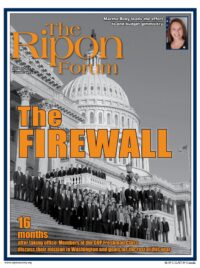My last job on the Hill was for a Congressman who was elected as part of the GOP Class of ’94.
I joined his staff in August of 1995 – well after the first 100 days that saw votes on every plank of the Contract with America, but still in the middle of the Republican Revolution.
It felt like a fast-moving train, with message discipline and issues of the week and a legislative strategy geared around the basic principles that won Republicans their majority. The train came crashing to a stop just before Christmas that year with the government shutdown.
The shutdown ended whatever momentum Republicans had built up over the previous 11 months, and left the party struggling to regain its focus as it entered the 1996 presidential election year. Sometime during that period, USA Today asked Freshman Republicans what they had accomplished over the previous 11 months since taking office.
It fell on me to draft the response, which essentially stated that one of the main things the Class of ’94 had succeeded in accomplishing was to change the terms of the debate in Washington. No longer were Congress and the President debating how much more to tax or how much more to spend. Instead, they were debating how much taxes should be cut and how much spending should be reduced.
I was reminded of that response at a May 9th breakfast The Ripon Society held with Reps. Kristi Noem and Tim Scott. Noem and Scott are members of the latest Republican Revolutionary Class – the Class of 2010. The purpose of the breakfast was to hear their thoughts on their first 16 months in office – what they have learned, what they have accomplished, and what they have set out to do. Noem’s remarks in this regard sounded strikingly familiar.
“The conversation has definitely shifted in Washington,” she stated. “Instead of talking about how much more we can constantly spend or how much more of the hardworking taxpayer money we attribute to different programs, we are talking about where we can tighten our belts.” Her words brought back memories of the argument 16 years ago that, amid the government shutdown and the political paralysis that had ensued, Republicans had succeeded in changing the nature of the debate.
We now live in another era of political paralysis, an era that many are calling dysfunctional. To the extent that these two eras mirror each other, it is worth noting that the paralysis of 1995-1996 was followed by historic agreements on reforming welfare and balancing the budget. Perhaps today’s dysfunction will be followed by a similar period of accomplishment on reducing the debt and reforming entitlements.
If that is the case, then the Republican Class of 2010 won’t just have changed the conversation in Washington, as Noem put it. And they won’t simply have acted as a firewall, as Tim Scott put it in that same Ripon breakfast and is described further in this latest edition of the Forum. Instead, they will have served as a catalyst that helped curb the growth of government and changed the trajectory of America.
Lou Zickar
Editor
The Ripon Forum
louzickar@clu.ccw.mybluehost.me




